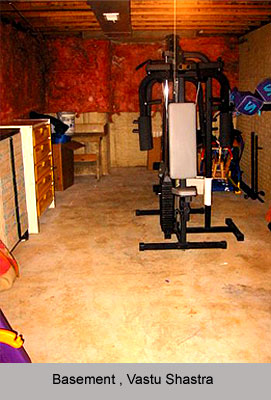 The art or science of Vastu Shastra is almost 5000 years old. It has evolved from the ancient Indian sages. Even today the rules mentioned in it for constructions are followed. The Indian Vastu Shastra divided the interiors of a flat or building into separate units and provides exhaustive tips on the individual units. Basement is a part of most of the buildings. They are found in residences and even in business establishments. If neglected there may be repercussions. Hence it is advisable that the basements are constructed keeping certain tips in mind.
The art or science of Vastu Shastra is almost 5000 years old. It has evolved from the ancient Indian sages. Even today the rules mentioned in it for constructions are followed. The Indian Vastu Shastra divided the interiors of a flat or building into separate units and provides exhaustive tips on the individual units. Basement is a part of most of the buildings. They are found in residences and even in business establishments. If neglected there may be repercussions. Hence it is advisable that the basements are constructed keeping certain tips in mind.
•The basement cannot be a suitable place for any auspicious work as the sunrays do not enter. As a result the advantages are also minimized.
•If l/4th part of the basement is above the ground level or if the sunrays enter the basement from 7 a.m. to 10 a.m. then one can utilize 75% of the basement for business
•In some western countries, particularly in Japan, slanting mirrors are fixed in such a way that sun rays are reflected in the basement. As a result of this there can be some help for the growth of the business.
•It must always be remembered that nobody should reside in the basement. If done unfortunate events occur and the any kind of development or growth will be seriously hampered.
•The basement should not be in the south or the west direction of the building. If at all it is so, it can be used as a godown or for storage of provisions.
•The favorable position for building a basement is either the east or the north direction. If the basement is in the north-east corner it is beneficial too.
•It is auspicious to make arrangements for the boring or water storage arrangement in the north-east corner of the north- east direction.
•In case the basement is in the north direction keep the heavy things in the south-west direction. Sitting and facing the north or building a ventilation in the north-west side is considered good and useful for business.
•If the basement is in the north-west corner the business flourishes but there is no cohesion in the work. Some serious ailments will occur. Thefts of small magnitude cannot be ruled out.
•A building with the basement in the south-west corner cannot be sold easily. The person doing business there never flourishes and there will be continuous loss. According to Vastu Shastra evil forces reside in this corner.
•The south-west part of basement cannot be even used as a godown. If there are water storages or well in it, it is most dangerous and destructive. The head of the family is likely to die an accidental death. It also leads to anemic condition and there is a possibility of suicide. In the south-east basement, hotels, bars, etc. can do some business. Agnidevta terminates all other businesses.
•It is preferable that there is no basement at all. In case there is one only the eastern and the northern part of it should be used. In the southern and the western parts unmovable heavy goods can be kept.
•The basement must be at least 9 feet high.
•The only color that can be used for painting it is white. Blue colour should not be used as it symbolizes spiritualism.
•In ancient times the western part of the basement was used for Samadhi. The face was kept towards the east. Such places of Samadhi should not be entered at all. If there is a dire need to visit this place then it should only be visited from 10 a.m. to 3 p.m. Before entering it should be kept open for least 15 minutes and there should be someone to accompany the individual.
•If there is water in a basement which is closed and not used for a long time, one should not step on the water. Infinite, invisible evil forces enter this water and it may be dangerous.
•However, many ancient temples have basements too. A basement exactly under the chief deity has a particular significance. But it is not meant for ordinary people. Because of the prayers of infinite devotees and their religious faith, the basement is filled with magnetic waves. However enters this place should not stay here for more that 3 minutes.
•A basement in the east or the north side with cash counter on the ground floor can prove beneficial.




















